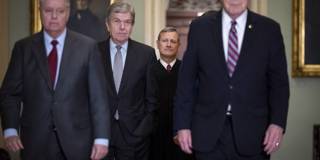The US Constitution is less a fixed “thing” than a process of creation and re-creation, an intergenerational project of stress and growth. President Donald Trump, without remotely appreciating or caring about what he has been doing, has engaged that creative process in transformative ways.
CAMBRIDGE – The United States is living through a remarkably convulsive period in its history. Donald Trump has reshaped the American presidency, and his norm-shattering behavior has tested the US Constitution in profound ways. He has placed stress on points of constitutional vulnerability, particularly when it comes to judicially unenforceable norms of respect for fact-based reality, for orderly decision-making, and for investigatory and prosecutorial independence.

CAMBRIDGE – The United States is living through a remarkably convulsive period in its history. Donald Trump has reshaped the American presidency, and his norm-shattering behavior has tested the US Constitution in profound ways. He has placed stress on points of constitutional vulnerability, particularly when it comes to judicially unenforceable norms of respect for fact-based reality, for orderly decision-making, and for investigatory and prosecutorial independence.